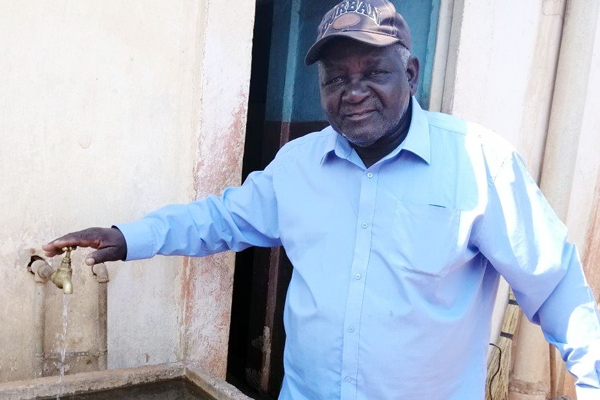
 “Back in the day, our Torwood used to be full of life, a lovely suburb with beautiful gardens and perfectly-manicured parks,” remembers Gogo Banda nostalgically. She has been a resident of Torwood high-density suburb, Section Q for over 30 years. Torwood is one of the suburbs in Redcliff town — “Home of the Steelmakers” — located about 220km south-west of Harare.
“Back in the day, our Torwood used to be full of life, a lovely suburb with beautiful gardens and perfectly-manicured parks,” remembers Gogo Banda nostalgically. She has been a resident of Torwood high-density suburb, Section Q for over 30 years. Torwood is one of the suburbs in Redcliff town — “Home of the Steelmakers” — located about 220km south-west of Harare.
“Before Ziscosteel [Zimbabwe Iron and Steel Company] shut down its operations, we never had water challenges. We actually competed as women in the neighbourhood to have the most beautiful gardens. We started experiencing challenges in 2009, sometimes we would go as long as two months without a drop of water,” said the 63-year-old.
“We only got relief when a former resident now based in New Zealand mobilised funds to drill a borehole for the community. However, it was still a struggle to fill containers as everyone in the neighbourhood relied on it, it required one to wake up at dawn to avoid queues.”
Dilapidated water infrastructure coupled with population growth and economic challenges contributed to the severe water challenges faced by Redcliff residents.
To help Redcliff town improve its water supply, ZimFund under its Urgent Water Supply and Sanitation Rehabilitation Project Phase Two (UWSSRP II), replaced an old, broken-down 250mm steel pipeline, which was no longer delivering water in Torwood suburb due to leakages and bursts, bringing joy to thousands of Torwood residents such as Gogo Banda. Other works in Redcliff included the rehabilitation of Rutendo booster pump station and sump, refurbishment of the Rutendo 10-megalitre reservoir, Torwood water booster pump station and supply of zonal and water meters benefiting close to 40 000 residents of Redcliff. The project is expected to be completed by the end of this month.
“Only 40% of the water pumped to Torwood would get into houses while 60% was lost along the way. After the pipe replacement under ZimFund, all the water is getting to houses,” said Redcliff town engineer Thembani Kundhlande.
“We saw some people replacing pipes late last year and after some time we started receiving water in our taps. Our normal lives have been restored. We now grow vegetables, do gardening, laundry and maintain hygienic surroundings. May God bless the funders,” smiled Gogo Banda while tending her garden.
Redcliff mayor Clayton Masiyatsva added: “We are grateful to development partners such as ZimFund, who gave us resources to rehabilitate some of our infrastructure in water and sanitation. ZimFund is actually the first partner to offer such resources towards this important sector in Redcliff after the 2008 cholera outbreak.”
- Chamisa under fire over US$120K donation
- Mavhunga puts DeMbare into Chibuku quarterfinals
- Pension funds bet on Cabora Bassa oilfields
- Councils defy govt fire tender directive
Keep Reading
Despite the relief brought by ZimFund, residents are still subjected to water rationing. This is mainly because Redcliff town does not have its own water treatment plant and relies on Kwekwe city for its water supply.
During its thriving days, Ziscosteel helped in the funding of Sebakwe Dam, which supplies Kwekwe city with water, but since the company collapsed in 2008, Redcliff has been struggling to pay Kwekwe city leading to numerous water disconnections. Ziscosteel, located in Redcliff, was once one of Africa’s giant steel production companies and the majority of residents staying in Redcliff are former Ziscosteel employees.
ZimFund is a US$145 million rehabilitation of water and sanitation and energy infrastructure programme, which was established in 2010 after the 2008 cholera outbreak. The ZimFund programme is generously supported by the governments and people of Australia, Denmark, Germany, Norway, Sweden, Switzerland and the United Kingdom. ZimFund is managed by the African Development Bank (AfDB) as part of its operations to improve the quality of life in Zimbabwe. The AfDB also funds water and sanitation projects in other locations such as Bulawayo and Marondera and other sectors in Zimbabwe, including agriculture, transport, social, private, financial and energy sectors.
Disclaimer: Opinions expressed in this article do not necessarily reflect those of ZimFund donors, the African Development Bank, its board of directors or the countries they represent. For feedback and more information, kindly contact: ZimFund communications via: [email protected] and [email protected].











